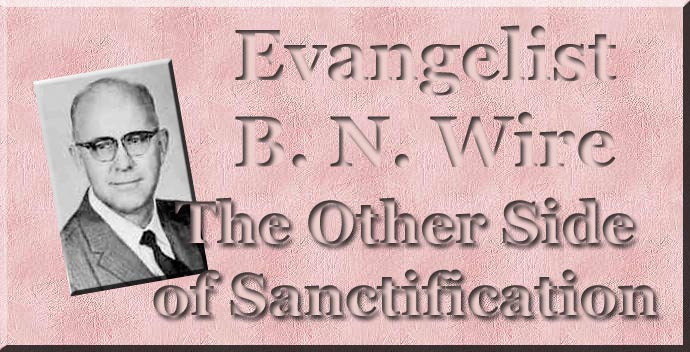
The Other Side Of Sanctification
By Evangelist B. N. Wire
Chapter 9
Temptation Over Changeableness Of FeelingsNinety nine out of every one hundred sanctified persons stumble over the temptation from changing emotions, especially in their early experiences. Much of this stumbling is due to an inability to distinguish between the accusations of Satan and the reproofs of the Holy Spirit. The Christian life from beginning to end is a life of faith, not a life of feeling. It is interesting to note that the word "feeling" is found only once in the Bible, whereas the word "faith" appears three hundred times. We are kept by the power of God "through faith". Following feeling is like riding the thermometer. Doing such means nothing but an up and down Christian experience. The one great sin of looking at the waning, changeableness of our feelings is that it destroys faith and diverts our attention from the cross, the blood, and the unfailing promise of God to our puny, failing human self. There is only one way to look and keep the victory by this act. Rev. F. Lincicome expresses it tersely: "Look within and be discouraged: look behind and be defeated; look around and be distressed; look ahead and be dismayed; look at others and be perplexed; look to Jesus and be happy." How wonderful it is to look to Jesus, the "author and finisher of our faith!" Satan, through the channel of the emotions, attempts to discourage God's people and side track them from the faith. Not only does Satan urge us to look at our feelings, but also he tempts us by comparing our experience with that of others. Through this channel he brings in many doubts. The temptation to doubt must be resisted as any other temptation. We often hear people make the statement, "I want an experience beyond a shadow of a doubt." But such is an impossibility. No man ever had an experience beyond the temptation to doubt and such temptation is indeed the shadow of doubt. But why be alarmed at Satan's buzzards of doubt floating over our heads? The sin of doubt like all other sin must come from yielding our wills. But some will persist, "I do not doubt God, I only doubt my experience." Satan causes many to stumble by pointing out how differently God deals with them from the way He does with their brethren, as they give their experience. There is no question that God deals very differently with different individuals as to the time and way in which He allows light to shine upon many things. For this reason we should, as the apostle said, "Above all have fervent charity among yourselves." I Peter 4:8. Some have received light upon some things when they were seeking forgiveness, which others did not receive until, and even after, they were sanctified. No doubt many of these things depend upon the training which one has received in the home and through the church. However, such is not always the case. God deals with each individual according to the power that worketh in him and these mysteries are hidden in His own infinite wisdom. Here are a few of the things upon which light may fall, even after one has attained the experience of holiness: new duties and responsibilities, greater sacrifices in order to render greater service and to have a closer walk with God. Light on restitution, on tithing, fasting and abstinence, reading the secular papers on the Lord's Day, taking joy rides and having the milk delivered unnecessarily on the Sabbath Day. There may also come light on doubtful habits and amusements. Another characteristic of Satan's attacks is that he may torment and urge us to give up any favor or grace that we may have in God in order to obtain more. Now, the Holy Spirit never calls attention to the feelings, but always to the facts in the case. He bids us keep our eyes upon the cross, the blood, and the promises of God that we may be "steadfast, unmovable, always abounding in the work of the Lord." I Cor. 15:58. These glorious facts are as unchanging and certain as God Himself, and as long as we look to them with well grounded faith, we cannot fall. Again, the Holy Spirit does not call us to look at and to measure our experience by how others feel or have felt. If it is a fact that our consecration is complete, there is no room for reasonable doubt concerning our own experience. The Holy Spirit never causes us to be discouraged because we see how much more grace others have and how much better than we do they pray, sing, testify, or preach. He encourages us with a hungering for more grace so that we may serve our Lord more efficiently. Also, the Holy Spirit never torments, accuses, or discourages. He may show us our need and uncover our sin. However, after revealing the swamps of the wilderness through which we are wandering He will turn the search light upon the hills of Canaan and tell us to go up and possess the land. The office of the Holy Spirit in relation to the sanctified is to comfort, teach, and to guide. He is come to reprove the world and be the Comforter of His people. However, it seems that the main office of the Holy Ghost has often been turned aside by the sin of His people so that He has been called to reprove when He should have been comforting and teaching them. |
|
 |
 |
|
|
|
-
Site Navigation
 Home
Home What's New
What's New Bible
Bible Photos
Photos Hiking
Hiking E-Books
E-Books Genealogy
Genealogy Profile
Free Plug-ins You May Need
Profile
Free Plug-ins You May Need
 Get Java
Get Java.png) Get Flash
Get Flash Get 7-Zip
Get 7-Zip Get Acrobat Reader
Get Acrobat Reader Get TheWORD
Get TheWORD